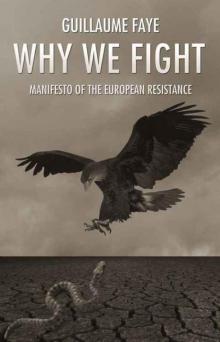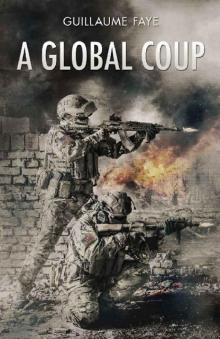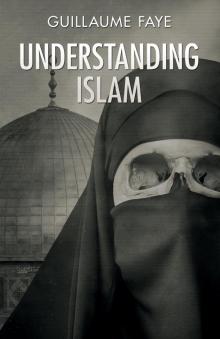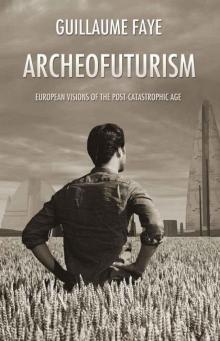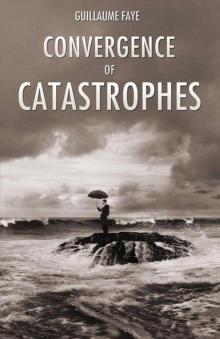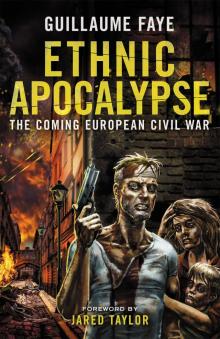Why We Fight, page 27




Xenophilia systematically overestimates the value of the alien, which it sees as a victim, as it unconsciously devalues the ‘Same’. It follows the principle that ‘the stranger has everything to teach us’ — it’s avowedly contradictory since it associates differentialism and universalism, the identity of the Other and miscegenation, advocating everyone’s ‘right to difference’, but at the same time the homogenisation of the human race. Xenophilia is the counterpart of ethnomasochism.
A rejection of xenophilia doesn’t necessarily lead to xenophobia, which is just as paralysing, but also to an affirmation of one’s self and one’s people — that is, ethnocentrism.
(see consciousness, ethnic; ethnocentrism; ethnomasochism)
5. Conclusion
Why Are We Fighting?
Why are we fighting?
Before answering this central question, perhaps it’s worth saying at first who this ‘we’ is. Perhaps it’s ‘you’, despite the superficial labels identifying you with one of the various parties or sects that the present tragedy will not hesitate to sweep away? ‘You’ — despite the misunderstandings that divide us — who intuitively senses the mortal dangers threatening France and Europe? ‘You’ — coming from every horizon and having become conscious of the biological, ethical, political, and spiritual decline of European civilisation and the nations comprising it — who has joined the resistance?
In this respect — and also in defining who ‘we’ are — it’s necessary to repeat that agnostics, pagans, and authentic Catholic or Orthodox Christians must demote their secondary philosophical differences, carry out a return to the real, and learn how to align themselves against the common enemy, who everyone well knows.
Another preliminary question: for whom do we fight? It’s not for a sect, a party, a denomination (except, if at all, in a provisional and temporary way) that we fight. It’s not for petty personal ambitions or intellectual vanity. We’re fighting not for the Right or the Left or the Centre — not for socialism or liberalism. These are only instruments, they don’t represent the essential.
We’re no longer fighting for other peoples. Both because we lack the means to do so, but also because every people, in its history, faces its destiny alone — it doesn’t need us to defend its identity.
* * *
We have to beware of false struggles. And here, there are two possible deviations:
The first is intellectualist: in the name of ‘metapolitical and cultural struggle’, one allies with purely abstract ideas for the sake of defending theoretical cliques and promoting the vanity of certain authors of limited audience, authors without links to the real and without any means of translating their ideas into a possible political or revolutionary project. This sort of deviation ends up, objectively speaking, rallying to the hegemonic ideology. Hence: the ensuing marginalisation, neutralisation, and collaboration.
The second deviation is that of the politician (a term to be distinguished, absolutely, from the term ‘political’): under the pretext of struggling for a certain social project, one makes a career out of it, in the government or a party, just as one might make a career in business. Positions accordingly soften, short-term tactics impinge on long-term strategies, militants are duped, the ideological baggage gets lighter and finally disappears or is converted into electoral propaganda that is never expected to be applied. Don’t think this means that political action is obsolete or useless. It’s an indispensable offshoot of what needs doing. Political struggle, though, has to be founded both on an ideological formation (the means) and on a disinterested ideal (the goal). Whenever notions of money or social vanity intervene, the revolutionary will is inevitably overwhelmed by the system.
Simply put: one doesn’t fight for a sect or an organisation — not for position or a career — but to establish a situation and carry out a tangible historical undertaking.
*
A similarly ambiguous and dangerous formula is to proclaim: ‘I fight for my ideas’. No! One doesn’t fight for ‘ideas’, one fights for a people — ideas are only the struggle’s instruments, not its goal. A conception-of-the-world has to be incarnated in the real, as an expression of a historical will, and not as an exposition of a savant’s ‘ideas’, which almost always remain dead letters. The profession of ideas is important, but under certain essential conditions:
1. These ideas may one day be realised in history, and thus as facts; they ought, then, to have the possibility of being realised and becoming a mobilising power.
2. These ideas ought not to be limited to critical descriptions of the actual state of things (this is the failing of ‘hyper-criticism’), but extended to construct new doctrines and affirm a positive project. To struggle ‘against’ is necessary, but insufficient. What’s necessary above all is struggle ‘for’ a new world. In an age of conformity and one-track thought, when there are no serious counter-propositions to the established order, we must retain a monopoly on revolutionary ideas.
3. One should never succumb to a ‘petty realism’ nor limit oneself to the politicians’ lowest common denominator; it’s necessary to go to the crux of the problem; and not because ideas unrealisable today will become so tomorrow. In this sense, historically-pregnant ideas demand an ambitious, visionary approach, indifferent to fashion and the apparent impossibility of their immediate application (see, for example, the notion of Reconquest).
4. It’s important to extend the field of ideas to include ‘non-theoretical ideas’, that is, myths, artistic and aesthetic creations, everything that electrifies the imagination.
To sum up: one doesn’t fight for ideas, but, among other things, one fights with ideas. Conversely: one well and truly fights the enemy’s ideas. One fights at the same time to maintain a certain number of key values in the people — values indispensable to its survival.
* * *
We struggle not only ‘against’, but above all ‘for’. Political, metapolitical, and cultural action — this antechamber of war — presupposes, to be sure, a designation of the enemy (of a hostile and negative energy), but it also presupposes a designation of the friend — for whom and with whom the struggle is waged. Similarly, it’s not a matter of limiting oneself to negativism or being content with denouncing and criticising hostile ideas and values — it’s just as necessary, as a counterpoint, to affirm positive ideas and values — understood as an alternative and a future.
We fight for Europe. We fight for a Europe infused with ideas of identity and continuity, of independence and power — this Europe that is an ensemble of ethnically related peoples. We fight, as well, not just for the Europeans of today, but also for those of tomorrow. We fight for the union and defensive mobilisation of all peoples of European origin, in our native lands, from the Atlantic to the Pacific — for the sake of an ethnocentric Eurosiberia — a bloc formed against the common enemy, which implies, of course, no rejection at all of French, German, Russian, Italian, Spanish, Flemish, etc., traditions.
We fight with a sense of urgency, to stop the invasion and to reverse Europe’s biocultural destruction (in the form of Islamic colonisation and American domination). It’s thus a matter of first putting out the fire. Questions as to whether it will be a Europe of nations or a federal Europe of regions are secondary ones — to be resolved once the fire is extinguished, once the invaders have been thrown back. The important thing to realise is that a Europe completely Islamised, Third-Worldised, and Americanised will be neither a federation nor an association of nations, it will no longer be anything European. We fight thus in knowing that the struggle of French or German or other nationalists — or regionalists — is irrelevant and suicidal, because from Brest to Vladivostok, we are, whether we like it or not, brother-peoples, and it’s vital that we maintain the same solidarity between us that Muslim peoples maintain among themselves (despite their great internal differences). The enemy here provides, perhaps, an example to follow . . . The essential is not to struggle solely for isolated micro-nationalisms, each of which lacks the stature necessary to confront the tragic challenges of the coming century.
To criticise the immense failings, connivances, and corruptions of the present European Union is no cause to turn away from the European idea, away from the idea of Great Europe, the sole tangible, realisable ideal — the sole line of defence against an enemy who can assume multiple forms. That Europeans should remain internally divided: that’s the strategy of the Pentagon and the Muslim states (which have already launched their countless masses in an assault against the Continent).
To fight for Europe’s survival and regeneration will also entail refusing to cooperate with French ‘sovereigntists’ defending a cosmopolitan and Jacobin vision of France (in the universalist tradition of the Revolution) — just as it will entail refusing to cooperate with Left-wing regionalists rejecting the region’s ethnic dimension.
Though European peoples are today besieged internationally and subverted domestically, nothing yet is lost — as long as there emerges — however haltingly, but powerfully — a Great-European ethnic consciousness, which could come about with the help of a few catastrophic storms to clear the way.
*
We fight for a vision of the world that is both traditional and Faustian, that allies enrootment and disinstallation, the citizen’s freedom and imperial service to the community-as-a-people, passionate creativity and critical reason, an unshakable loyalty and an adventurous curiosity.
We fight for social justice, for the systematic establishment of European preferences in every domain, for Eurosiberian economic autarky, but also for free enterprise and for the conservation of the Continent’s ecosystem.
We fight for the principle of libre examen[245] and for freedom of thought — for popular and aristocratic values of honour, virility, and power.
We fight not for ourselves alone, the living, or for our economic welfare, but above all for the heritage of our ancestors and the future of our descendents.
We fight for a cultural, spiritual rebirth, for a return to the real, to vitality. We fight to re-animate our ancestral virtues — we fight for Achilles,[246] Pericles,[247] and Romulus,[248] for Charles the Hammer and Francis of Assisi[249] — for the cathedral builders and the rocket scientists.
We fight for the continuity of that European civilisation (of which America is nothing but the prodigal child) that is tragic, because of its tendency to self-destruction and self-doubt, but at the same time because of its superiority over all the other civilisations in history. We fight thus in a spirit whose essence is ethnocentric — in a spirit that breaks with all that is presently leading Europe toward suicide.
As implied in all of the above, we fight to produce a shearing historical metamorphosis — to bring about the Fourth Age of European civilisation.
*
And now: what is to be done? To respond, it’s necessary to address a second key question: how to fight? It would be vain and pretentious to give a definitive answer — since history, by definition, is the field of the unforeseen. Only the general axes of our struggle are imaginable. First off, we need to reject those petty, presumptuous masters — whose professed convictions will never be paid for with their lives, their security, or their comfort, though they think they have the definitive answer to this most difficult question. The ‘why’, in any case, is always easier to formulate than the ‘how’. The ‘how’, though, is crucial, for it presumes both a prescience of the history to come and a profound understanding of past errors and successes.
Let us start by answering the question in the spirit of that celebrated, laconic, and very pragmatic English proverb: ‘That every man will do his duty’.
The first imperative is thus to think of oneself as being in a state of dissidence — in resistance — against the entire system. Hence, the necessity of seriously constructing a real counter-society, an embryo of the coming society. This is not to be done in a marginalising and extremist spirit (which only serves the enemy), but rather with efficacy and cunning, according to the precept of ‘being in the world but not of it’.[250]
This struggle, moreover, is no desperate counter-current, since world events give us cause to believe that the situation is heading toward a great crisis — toward a chaos from which history will be reborn.
The second imperative is one of radical thought: to refuse to save an unsavable system, as conservatives vainly endeavour to do, and instead take a revolutionary stance oriented to the post-chaos.
The third imperative is to prefer a tactic of supple networks of solidarity to one of monolithic, faction-ridden sects.
The essential thing is to act and to coordinate at a subterranean level. Everything is good, if it is well done and thought out. The circle, the party, the individual, the association, the enterprise, etc., have their place in this network — on the condition that they’re organised at the Continental level and that personal or ideological differences don’t undermine the common front against the enemy. For it’s never the system’s censorship or repression that hinders the efficacy of a revolutionary movement, but rather the movement’s internal dissensions and rivalries. The main thing is knowing who is our friend and who is our enemy. In this sense, we might take Islam as a model, for from the beginning of its jihad against Europe it has known how to unite despite its grave internal divisions. Petty passions must give way to great passions.
The fourth imperative is not to abandon the political terrain, but to struggle, each in his own place, according to a multi-form strategy that addresses the different political, cultural, and metapolitical arenas of European life. There’s no need to quit a political party if it’s helpful to the cause, even if it’s not one hundred percent in accord with our struggle. Even in the present situation, an objectively revolutionary, dissident party would have an agitprop (agitation-propaganda) capability independent of its electoral objectives and prospects. With such a polyvalent strategy, every combatant will have his speciality and his place; for certain militants it will be appropriate to adopt the maxim larvatus prodeo (‘I go forth masked’), while others will openly advance toward the Great Day.
Fifth imperative: in the long term, the birth of a revolutionary European-identitarian party is indispensable. It needs to be prepared. Politics remains the indispensable horizon of action. And metapolitics, like all intellectual and cultural strategies, constitutes but one basis for what will be a political act — as long as politics here is not reduced to the activity of politicians, and metapolitical discourse doesn’t deviate into a form of intellectual verbiage or pseudo-philosophical masturbation.
*
To sum up: it’s necessary that everyone does his duty and works in his place — devotes himself to constructing a body of fundamental values — against the common enemy — in a network of active, supple, interdependent, and confederated resistance — present on every front, at the level of Europe — with the aim of concentrating all the energies of the combatants.
The latter are innumerable . . . and more powerful than people realise. Many have yet to mobilise and regroup because they’re still too closely tied to sectarian spirits and the defeatist logic of the ghetto. The system’s present grave crisis, if properly used, can, however, multiply the vitalist forces in every recess of the European nation. For the future is full of both hope and tragedy. Hope because all the facts, and the general course of developments, are occurring in ways that validate our analysis and that, even if there’s no reaction yet, more and more people share the analyses, values, and objectives presented here. It’s tragic because we have to await the escalation of perils, persecutions — war.
*
Nothing is lost. It’s completely inappropriate to see ourselves, in the nostalgia of despair, as a rearguard, a last outpost, that struggles with panache for a lost cause. No, we have to see ourselves as the vanguard of the resistance, whose lucid spirit exudes a certain optimism. But let there be no illusion. Victory won’t be won through peaceful bourgeois reform or through the vaticinations of an aesthetic and ‘literary’ libertinism. We have to prepare ourselves for the coming tempest, to harden ourselves — for the sake of attacking, like a cobra, quickly and decisively, once the moment of opportunity strikes. In anticipating this moment, we need now to start arming ourselves — mentally and physically — we need to recruit, to proselytise, to educate, to organise in networks of solidarity and action. It’s simple: let’s model ourselves on our enemy.
*
And then, to speak symbolically and in a manner deliberately sibylline, what we strive to restore and re-animate will never come from the promises of middle class politicians, but will come instead from the spirit of the last Delphic prophecy,[251] which foresaw that, ‘One day Apollo will return and it will be forever’.
Other books published by Arktos:
Beyond Human Rights
by Alain de Benoist
The Problem of Democracy
by Alain de Benoist
The Arctic Home in the Vedas
by Bal Gangadhar Tilak
Revolution from Above
by Kerry Bolton
Metaphysics of War
by Julius Evola
The Path of Cinnabar:
An Intellectual Autobiography
by Julius Evola
Archeofuturism
by Guillaume Faye
Why We Fight
by Guillaume Faye
The Saga of the Aryan Race
by Porus Homi Havewala
The Owls of Afrasiab
by Lars Holger Holm
De Naturae Natura
by Alexander Jacob

